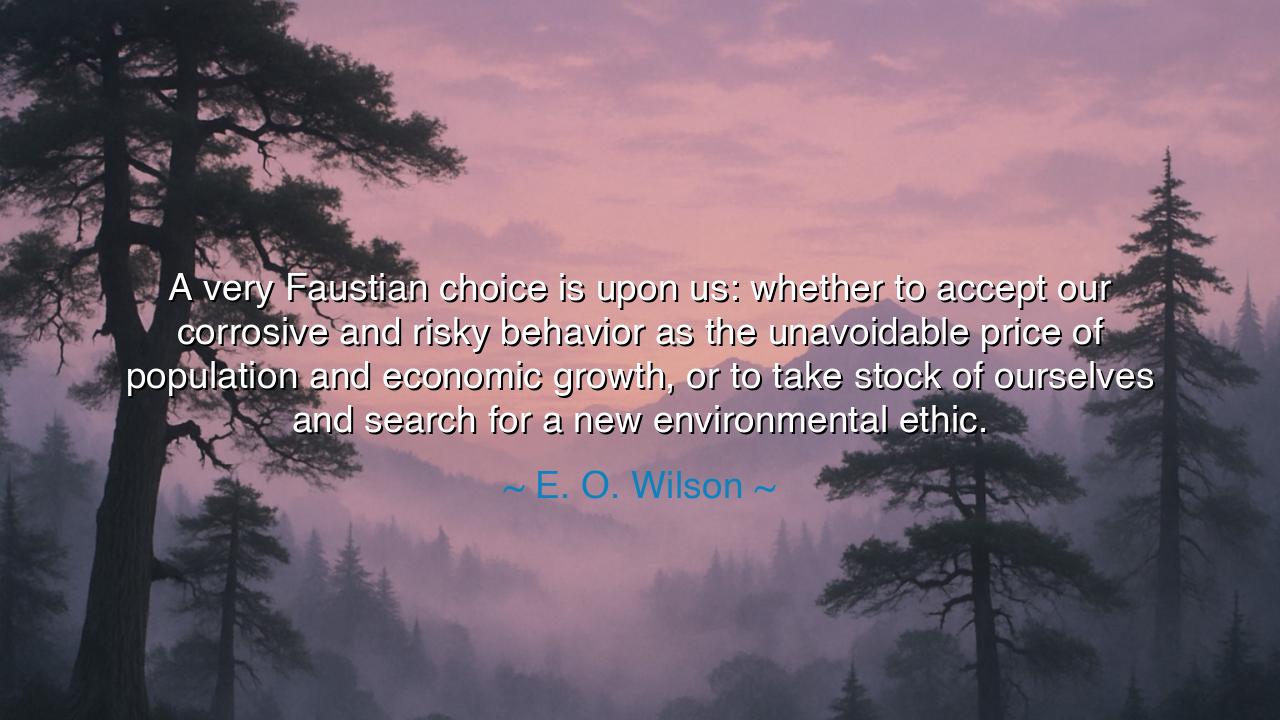
A very Faustian choice is upon us: whether to accept our
A very Faustian choice is upon us: whether to accept our corrosive and risky behavior as the unavoidable price of population and economic growth, or to take stock of ourselves and search for a new environmental ethic.






When E. O. Wilson declared, “A very Faustian choice is upon us: whether to accept our corrosive and risky behavior as the unavoidable price of population and economic growth, or to take stock of ourselves and search for a new environmental ethic,” he spoke as a prophet of the Earth, warning humanity at the crossroads of its destiny. His words are a cry from both science and soul, summoning us to confront the cost of our ambition. For in invoking the Faustian choice, Wilson drew upon one of civilization’s oldest metaphors — the tale of the scholar Faust, who sold his soul to the devil in exchange for knowledge and power. Humanity, too, he suggests, has made such a pact: trading the purity of the planet for the glitter of progress, sacrificing the eternal for the immediate.
The origin of this quote rests in Wilson’s lifelong devotion to biology, ecology, and the preservation of life’s diversity. Known as the “father of sociobiology” and a tireless advocate for the protection of nature, Wilson had witnessed, with the clarity of both scientist and philosopher, the unfolding tragedy of human excess. He saw forests fall for profit, oceans stripped bare for consumption, species vanish in silence — and he recognized that this was not mere misfortune, but choice. The modern world, he warned, was bound by its own creation: a system that prizes endless economic growth and expanding population above all else, even as these forces corrode the very foundation of life.
To call this choice “Faustian” is to frame it as a moral reckoning. In the legend, Faust gains everything he desires — knowledge, pleasure, mastery — but at the cost of his soul. In the same way, humanity’s pursuit of material progress has granted it godlike powers: to move mountains, harness atoms, and reshape climates. Yet, in this triumph, we have become estranged from the Earth that bore us. We have gained the world, yet stand in danger of losing our home. Wilson’s brilliance lies in recognizing that the bargain is not yet complete — that humanity still has time to take stock of itself, to step back from the precipice, and to reclaim its moral center.
History is filled with echoes of this moment. Consider the fall of ancient Mesopotamia, where over-irrigation salted the soil until crops could no longer grow. Or the collapse of Easter Island, whose forests were cut down to build monuments until there was nothing left to sustain its people. In every case, the same pattern emerges: a civilization that mistook growth for greatness, only to find itself undone by the very forces it unleashed. Wilson’s warning is not new — it is the timeless wisdom of the Earth, repeated in every age, ignored until it is too late. Yet his vision also carries hope: that unlike past civilizations, this generation possesses the knowledge and power to change its fate — if only it has the humility to act.
When Wilson calls for a “new environmental ethic,” he is not asking for mere policy or reform. He is calling for a transformation of the human spirit — a reawakening to the sacred bond between humanity and the living world. The old ethic of conquest must give way to one of kinship; the illusion of dominion must be replaced with the truth of interdependence. To live ethically within nature is not to deny progress, but to redefine it — to see prosperity not in the consumption of the Earth, but in the harmony of our existence with it. This is the wisdom of the ancients reborn: that to care for the land is to care for the self, and to wound it is to wound the soul.
The lesson in Wilson’s words is both urgent and eternal: that humanity stands on the edge of a bargain it cannot afford to complete. If we continue to treat the planet as expendable, we will inherit the emptiness of our own greed. But if we choose reflection over recklessness, stewardship over exploitation, then the story of Faust may yet end differently — not in damnation, but in redemption. Each person, each community, each nation must ask: What do we truly value? For whatever we worship — be it profit, power, or peace — will define our destiny.
So let this teaching pass to all who hear it: take stock of yourself, as Wilson urges. Plant where you once consumed. Restore where you once destroyed. Let your life be guided not by the myth of endless growth, but by the principle of enough. Teach your children that the Earth is not a resource, but a relative. For the choice before us is not between comfort and sacrifice — it is between extinction and renewal. And in making the right choice, humanity may yet reclaim what it once traded away: its soul.






AAdministratorAdministrator
Welcome, honored guests. Please leave a comment, we will respond soon